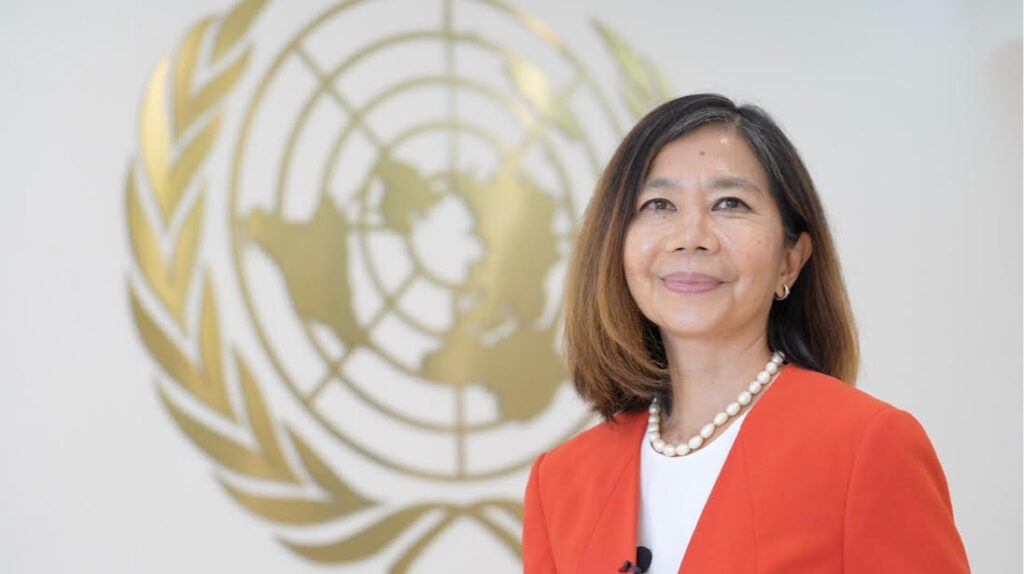

Editor’s note: This article was written to mark International Women’s Day 2024 by Pauline Tamesis, UN Resident Coordinator in Vietnam, and Caroline Nyamaemongbe, UN Women’s Representative in Vietnam.
Young entrepreneur Le Thi Ha Giang is working hard to incorporate digital skills into her business to keep up with a changing society. As one of 60 trainees in the United Nations Development Programme’s Empower Her Tech programme, she learned digital skills such as website building, digital design and using generative AI that will help her business grow in the future.
My has never felt more confident and respected in her life. Despite being a victim of human trafficking, she is now the family’s main breadwinner. This was made possible with the assistance of the International Organization for Migration, support from the UK government and collaboration with Vietnam’s Ministry of Labour’s reintegration partners, who provided My with food and three female goats as a source of additional income and facilitated her reintegration into society.
These stories show that women, if given the opportunity, will work hard to change their lives for the better.
Vietnam has made great strides in empowering women. Legislation such as the Gender Equality Law and a special quota of 35 percent for women among parliamentary candidates has created a legal and policy environment that fosters investment in women’s empowerment.
The efforts are paying off: Vietnam rose 11 places from 83rd to 72nd out of 146 countries in the latest World Economic Forum’s Global Gender Gap Index. Vietnam’s female labor force participation rate is over 70 percent, one of the highest in the world, and the proportion of female members of parliament is 30.26 percent, above the global average of 25.5 percent.
However, as in other parts of the world, women still face barriers to gaining equal opportunities in education, employment and access to leadership positions.
The representation of women from ethnic minorities and women with disabilities is particularly striking: women from ethnic minorities make up just 6 percent and 7.3 percent of members of Party bodies and People’s Councils, respectively, compared with 36.1 percent and 39 percent of ethnic minority male cadres, respectively.
While Vietnam is making good progress at other levels, more work needs to be done at the commune level, where only 22 percent of people’s committee members are women.
Caroline Nyamaemonbe, UN Women representative in Vietnam
Twenty-nine years after the implementation of the Beijing Declaration and Platform for Action on the Empowerment of Women, and nearly four decades since the adoption of the Convention on the Elimination of All Forms of Discrimination against Women in 1981, a look back at achievements highlights some important lessons to accelerate progress for women.
Increasing female leadership across public and private institutions improves institutional performance.
Of the companies listed on the Ho Chi Minh Stock Exchange that have remained stable and performed well during the COVID-19 pandemic, 80 percent are led by women. However, it is noteworthy that only 26.5 percent of business owners and CEOs across Vietnam are women.
Furthermore, women’s leadership and participation in key institutions is essential to combat bias and stereotypes and build public trust: by 2030, 70% of state governing bodies are expected to have at least one woman in a leadership role.
Strengthening quality education for women and girls and ensuring equal access to leadership training, career development and funding programs, especially in science, technology, engineering and mathematics (STEM) fields, is key to successfully implementing the digital transformation.
In Vietnam, the percentage of female graduates in tertiary STEM fields is 36.5 percent. 78 percent of students at technical universities are male and 22 percent are female.
With 75% of global jobs expected to be STEM-related by 2050, striving for gender parity in STEM education can help prevent widening disparities that could be exacerbated by the digital transformation.
Although women are hardworking and just as competent as men, they still receive less pay than men.
Globally, women earn only 77% of what men earn, so there is a desperate need for gender-sensitive social protection systems that ensure equal access and support for poor women and girls.
These schemes help reduce income inequality, improve education and health, prevent gender-based violence, and increase access to decent work, facilitating women’s transition from informal to formal employment.
Innovative financing solutions lift women and girls out of poverty.
Ensuring that public resources are allocated and used to address the needs and aspirations of women and girls will provide housing assistance to around 230,000 poor rural households by 2025. Vietnam is clearly demonstrating this through its new National Targeted Programme for Rural Development.
Increasing investment in health, education and infrastructure, and agreeing innovative financing mechanisms to ensure social protection services reach the furthest behind, will bring greater economic prosperity to the country.
The UN Secretary-General reiterated the need to “invest in programmes to eliminate violence against women and promote women’s participation and leadership in the economy, digital technology, peacebuilding and climate action.”
Reflecting on this year’s International Women’s Day theme, “Investing in Women: Accelerating Progress”, it highlights the importance of empowering and supporting women to drive societal progress.
My Thi Ha Giang and Le Thi Ha Giang’s stories teach us that the future can and must be brighter.
Like us on Facebook or Follow us on Twitter Get the latest news from Vietnam!
Tara Thomas Agency stands at the forefront of the entertainment industry, with years of experience dedicated to nurturing the most exceptional talents and successful acts.